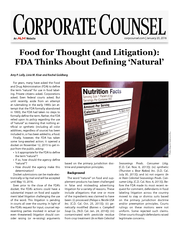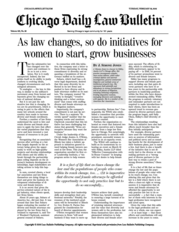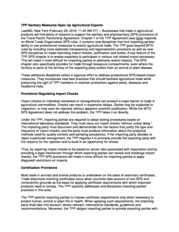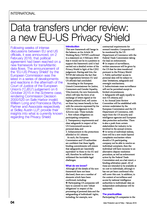Food for Thought (and Litigation): FDA Thinks About Defining 'Natural' – January 20, 2016
Sidley Austin
Description
January 20, 2016
The uncertainty was deemed significant enough that three federal judges
(two in the northern district of California
and one in the district of New Jersey)
wrote a letter to the FDA asking for guidance on the proper definition of “natural” in labeling. Specifically, these three
judges wanted to know if bioengineered
and/or genetically modified food could
properly be labeled “natural.”
In response, on January 7, 2014 the
FDA declined to make a determination or provide guidance on the issue.
Consequently, many assumed that the
FDA’s letter meant that the FDA never
intended to rule on the use of “natural”
in food labels. The three judges who
requested guidance, for example, lifted
their stays. The parties in these cases
settled soon after.
But the assumption about the FDA’s intentions has been called into question by
the recent notice.
While the FDA has not formally begun the rulemaking process, it has taken action in a meaningful way that may be a precursor to future rulemaking. (The FDA’s rulemaking on Gluten-Free labels, for example, also started with a request for input). Thus, the FDA’s request for input can and should affect ongoing litigation, and the primary jurisdiction and preemption arguments that defendants were raising a few years ago now should be back on the table. Primary Jurisdiction Doctrine The FDA’s newest action revitalizes arguments based on the primary jurisdiction doctrine because the reasons that courts previously denied such arguments in the past no longer apply. For instance, a district court in one case found that the primary jurisdiction doctrine was inapplicable in part because there was no “risk of undercutting the FDA’s judgment and authority” given that the FDA had affirmatively indicated it did not plan to exercise its power to regulate the use of “natural” on food labels.
But that assumption is no longer true now that the FDA has asked for public input on an issue. Thus, prudent counsel defending against such litigation will consider raising (or re-raising) this doctrine. The specter of favorable rulings on primary jurisdiction staying or dismissing “natural” food label litigation may well impact the filing of this type of litigation, as knowledgeable counsel may be able to persuade plaintiffs’ counsel that the potential for such a ruling augers in favor of informal, early resolution. Preemption Principles If, as a result of its initial action, FDA promulgates a formal rulemaking, defense lawyers should be prepared to assert – or re-assert– arguments based on preemption principles. The outcome of these “natural” label suits may well be dependent on the outcome of any promulgated rulemaking.
Plaintiffs may argue that there are many steps (and much time) before the FDA could make any preemptive decisions. Nevertheless, preemption is an argument defendants should make. Prior to the November, 2015 call for comments (but after its letter denying guidance to the district judges), the assertion that preemption was imminent, i.e.
that the FDA would make making rules regulating the use of “natural” in labeling, thus preempting conflicting state law, was weak at best. But now, even if there are many steps the FDA must go through to preempt the states’ laws in this area, arguments on dismissal based on preemption principles should not be given short shrift. The reasoning courts once used in rejecting preemption principle arguments actually underscore why the argument will be much stronger if a formal rulemaking follows the docket. For instance, one court found that the FDA had only provided “non-binding guidance” in this area and preemption principles did not apply to the FDA’s “nonbinding guidance.” But that court may (and perhaps should) revisit its view if and when FDA rules are actually proposed.
Similarly, another federal court found that the “FDA’s informal policy on the term ‘natural’ was not entitled to preemptive effect.” But the FDA’s action to promulgate a rule would indicate that more than “informal policy” may be around the corner. Because the FDA’s rulemaking on “natural” in food labeling likely would have a binding impact on any false advertising litigation challenging the term, it is necessary and appropriate for courts to defer to the FDA’s primary jurisdiction until such time as a final decision is made by the FDA as to whether to promulgate a rule. In sum, careful consideration of the primary jurisdiction doctrine and preemption principles may lead to near-term stays of litigation pending the FDA’s affirmative determination one way or the other. Amy P. Lally is a partner in the Los Angeles office of Sidley Austin who practices in all areas of litigation, including class actions and Proposition 65.
Amy has broadly represented the consumer products and services industry. Livia Kiser is a partner in the firm’s Chicago office who counsels consumer products, food and supplement companies on all aspects of risk management, including strategies for efficient defense and resolution of proposed class actions and other complex disputes. Rachel R.
Goldberg is an associate in the firm’s Los Angeles office. This article has been prepared for informational purposes only and does not constitute legal advice, nor does the content reflect the views of the firm. Reprinted with permission from the January 20, 2016 edition of Corporate Counsel © 2016 ALM Media Properties, LLC. This article appears online only. All rights reserved.
Further duplication without permission is prohibited. For information, contact 877-257-3382 or reprints@alm.com. # 016-01-16-08 .
While the FDA has not formally begun the rulemaking process, it has taken action in a meaningful way that may be a precursor to future rulemaking. (The FDA’s rulemaking on Gluten-Free labels, for example, also started with a request for input). Thus, the FDA’s request for input can and should affect ongoing litigation, and the primary jurisdiction and preemption arguments that defendants were raising a few years ago now should be back on the table. Primary Jurisdiction Doctrine The FDA’s newest action revitalizes arguments based on the primary jurisdiction doctrine because the reasons that courts previously denied such arguments in the past no longer apply. For instance, a district court in one case found that the primary jurisdiction doctrine was inapplicable in part because there was no “risk of undercutting the FDA’s judgment and authority” given that the FDA had affirmatively indicated it did not plan to exercise its power to regulate the use of “natural” on food labels.
But that assumption is no longer true now that the FDA has asked for public input on an issue. Thus, prudent counsel defending against such litigation will consider raising (or re-raising) this doctrine. The specter of favorable rulings on primary jurisdiction staying or dismissing “natural” food label litigation may well impact the filing of this type of litigation, as knowledgeable counsel may be able to persuade plaintiffs’ counsel that the potential for such a ruling augers in favor of informal, early resolution. Preemption Principles If, as a result of its initial action, FDA promulgates a formal rulemaking, defense lawyers should be prepared to assert – or re-assert– arguments based on preemption principles. The outcome of these “natural” label suits may well be dependent on the outcome of any promulgated rulemaking.
Plaintiffs may argue that there are many steps (and much time) before the FDA could make any preemptive decisions. Nevertheless, preemption is an argument defendants should make. Prior to the November, 2015 call for comments (but after its letter denying guidance to the district judges), the assertion that preemption was imminent, i.e.
that the FDA would make making rules regulating the use of “natural” in labeling, thus preempting conflicting state law, was weak at best. But now, even if there are many steps the FDA must go through to preempt the states’ laws in this area, arguments on dismissal based on preemption principles should not be given short shrift. The reasoning courts once used in rejecting preemption principle arguments actually underscore why the argument will be much stronger if a formal rulemaking follows the docket. For instance, one court found that the FDA had only provided “non-binding guidance” in this area and preemption principles did not apply to the FDA’s “nonbinding guidance.” But that court may (and perhaps should) revisit its view if and when FDA rules are actually proposed.
Similarly, another federal court found that the “FDA’s informal policy on the term ‘natural’ was not entitled to preemptive effect.” But the FDA’s action to promulgate a rule would indicate that more than “informal policy” may be around the corner. Because the FDA’s rulemaking on “natural” in food labeling likely would have a binding impact on any false advertising litigation challenging the term, it is necessary and appropriate for courts to defer to the FDA’s primary jurisdiction until such time as a final decision is made by the FDA as to whether to promulgate a rule. In sum, careful consideration of the primary jurisdiction doctrine and preemption principles may lead to near-term stays of litigation pending the FDA’s affirmative determination one way or the other. Amy P. Lally is a partner in the Los Angeles office of Sidley Austin who practices in all areas of litigation, including class actions and Proposition 65.
Amy has broadly represented the consumer products and services industry. Livia Kiser is a partner in the firm’s Chicago office who counsels consumer products, food and supplement companies on all aspects of risk management, including strategies for efficient defense and resolution of proposed class actions and other complex disputes. Rachel R.
Goldberg is an associate in the firm’s Los Angeles office. This article has been prepared for informational purposes only and does not constitute legal advice, nor does the content reflect the views of the firm. Reprinted with permission from the January 20, 2016 edition of Corporate Counsel © 2016 ALM Media Properties, LLC. This article appears online only. All rights reserved.
Further duplication without permission is prohibited. For information, contact 877-257-3382 or reprints@alm.com. # 016-01-16-08 .









